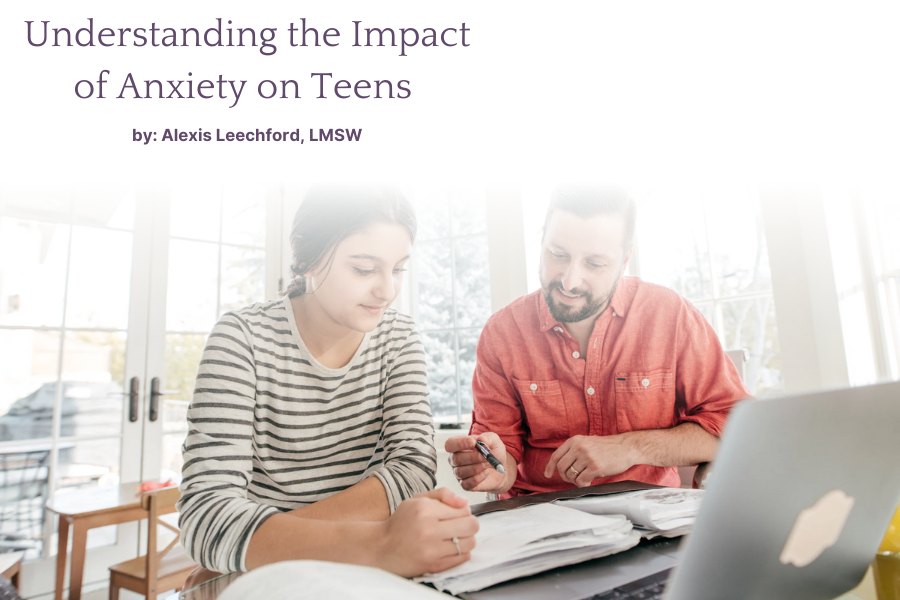Today’s teens face a complex world filled with academic, social, and personal pressures, making anxiety one of the most common mental health challenges they encounter. As an adult who has been out of high school for over a decade, I can confidently say that the pressures and complexities teens face today are far greater than before. The constant presence of social media, higher academic expectations, and an increasingly uncertain world create stressors that many parents and educators may not fully understand. This gap in understanding can make it difficult for teens to open up and share their struggles, leaving them feeling isolated or unheard.
The teenage years are a time of tremendous growth and change—academically, socially, and emotionally. While some anxiety is normal, persistent or overwhelming anxiety can interfere with a teen’s well-being, relationships, and ability to thrive.
How Anxiety Manifests in Teens
Anxiety doesn’t always look the same in teenagers as it does in adults. Some common signs include:
- Physical symptoms: Headaches, stomachaches, fatigue, or muscle tension.
- Behavioral changes: Avoidance of school, friends, or activities they once enjoyed.
- Emotional signs: Irritability, feelings of restlessness, or a constant sense of dread.
- Cognitive effects: Difficulty concentrating, racing thoughts, or a fear of failure.
Teens may struggle to articulate their feelings, making it crucial for parents and educators to recognize the signs.
Factors Contributing to Anxiety in Teens
Several factors contribute to anxiety during adolescence, including:
- Academic Pressure: High expectations and the competitive nature of school can lead to performance anxiety.
- Social Challenges: Navigating friendships, social media, and peer pressure can create insecurity and self-doubt.
- Family Stress: Family conflict, financial worries, or high parental expectations can add to a teen’s stress.
- Biological Changes: Hormonal fluctuations and brain development during adolescence can amplify emotional responses.
- The Stress of Adults Around Them: Teens are greatly impacted by the stress of the adults in their lives. Whether it’s parents, teachers, or other caregivers, when adults struggle with their own anxiety or stress, teens often absorb that tension. It’s important for the adults raising teens to role model self-care and healthy coping strategies. By demonstrating that it’s okay to struggle—but also showing how to manage stress effectively—adults can empower teens with the tools they need to navigate anxiety in a healthy way.
The Impact of Anxiety on Teens
Unchecked anxiety can affect teens in profound ways:
- Mental Health: Anxiety often coexists with depression, impacting overall emotional well-being. When left feeling alone and overwhelmed over time, teens are also at a higher risk of experiencing suicidal ideation. The weight of anxiety combined with feelings of hopelessness can become too much to bear without proper support.
- Academic Performance: Worry and fear can make it hard to focus, leading to declining grades or school avoidance.
- Physical Health: Chronic anxiety can contribute to health issues like fatigue, digestive problems, and weakened immunity.
- Social Isolation: Teens with anxiety may withdraw from friends and family, missing out on meaningful connections.
Helping Teens Cope with Anxiety
If you suspect a teen is struggling with anxiety, there are ways to provide support:
- Open Communication: Create a safe, judgment-free space for them to express their feelings.
- Encourage Healthy Habits: Regular exercise, balanced nutrition, and adequate sleep can improve mental health.
- Teach Relaxation Techniques: Deep breathing, mindfulness, and grounding exercises can help manage anxious thoughts.
- Set Realistic Expectations: Help them prioritize and break down tasks to reduce overwhelm.
- Explore Therapy Options: 1) Talk Therapy Approaches: Many teens benefit from traditional talk therapy, such as Cognitive Behavioral Therapy (CBT). CBT helps teens recognize and challenge negative thought patterns, develop healthier coping strategies, and gradually face anxiety-provoking situations in a controlled and supportive way. Other approaches, such as Acceptance and Commitment Therapy (ACT) or Dialectical Behavior Therapy (DBT), can also help teens build emotional resilience and manage distressing emotions effectively. 2) Eye Movement Desensitization and Reprocessing (EMDR): Another effective treatment for anxiety is EMDR, a therapy originally developed for trauma but also beneficial for anxiety. EMDR targets distressing memories, thoughts, or emotions that may contribute to a teen’s anxiety. Through guided eye movements or other forms of bilateral stimulation, teens can reprocess these triggers in a way that reduces their emotional intensity.
A Note to Teens
If you’re a teen dealing with anxiety, remember: you’re not alone. Anxiety can feel overwhelming, but with the right tools and support, it’s manageable. Don’t hesitate to reach out to someone you trust—whether it’s a parent, teacher, or therapist.
Final Thoughts
Anxiety doesn’t have to define a teen’s life. By fostering understanding, providing support, and encouraging help-seeking behavior, we can empower teens to navigate their challenges and build resilience.
By Alexis Leechford, LMSW

